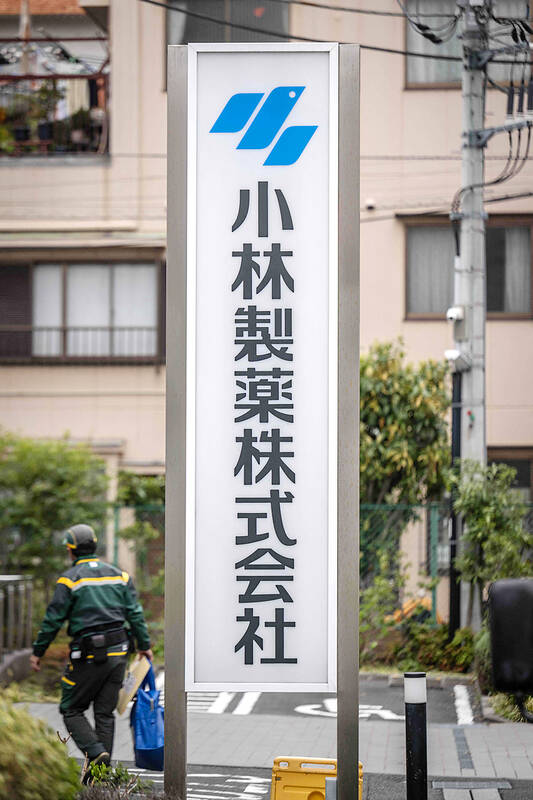Japanese drugmaker Kobayashi Pharmaceutical, which is at the center of a health scare, yesterday reported two more deaths potentially related to its dietary supplements.
In Taiwan, the Food and Drug Administration (FDA) said that it is investigating a report of a Kaohsiung woman with kidney failure who had taken similar supplements for years.
Last week, Kobayashi Pharmaceutical recalled three supplement brands — including “Beni Koji Choleste Help” — after customer complaints of kidney problems.

Photo: AFP
The over-the-counter products contain an ingredient called red yeast rice, or “beni koji,” which is supposed to help lower cholesterol.
Yesterday’s announcement brought the total number of deaths under investigation by the company and the Japanese Ministry of Health to four, with more than 100 people hospitalized.
Japanese Prime Minister Fumio Kishida said in parliament that “after the cause is identified, the government will examine what measures are necessary to prevent similar incidents.”
“We will clarify the causes and, if necessary, I think we need to consider all possible measures,” he said.
Kishida was responding to an opposition politician who had urged him to revise safety frameworks that were relaxed under former Japanese prime minister Shinzo Abe.
Kobayashi Pharmaceutical sells a wide range of health products marketed through television advertisements in Japan.
Medical studies describe red yeast rice as an alternative to statins for lowering high cholesterol, but also warn of a risk of organ damage depending on its chemical make-up.
The Osaka-based company says it has also supplied red yeast rice to about 50 other firms in Japan and two in Taiwan.
KAOHSIUNG CASE
In Kaohsiung, the woman’s husband told reporters that his 70-year-old wife, surnamed Chen (陳), had acute kidney failure in March last year and began dialysis in May.
Before then she had taken red yeast rice supplements from Taiwan’s Da Yi Biotech & Health Food Co Ltd (大醫生技) for three or four years, he said.
He said he was notified by Da Yi Biotech on Wednesday that it was issuing a preventative recall of its red yeast rice products and advised people not to consume any.
FDA Deputy Director-General Lin Chin-fu (林金富) told reporters that the company sourced red yeast rice from New Taipei City-based SHS Biotech Co (三合興產業股份), which in turn purchased it from Kobayashi Pharmaceutical.
Da Yi Biotech was one of the companies the FDA on Wednesday asked to remove the product from its shelves as a precaution, Lin said.
However, it is not yet known whether the woman’s kidney condition is related to the supplement, it added.
Lin said that Chen did not take Kobayashi Pharmaceutical-branded products and urged her family to contact their local health officials.
Additional reporting by CNA

UNITED: The premier said Trump’s tariff comments provided a great opportunity for the private and public sectors to come together to maintain the nation’s chip advantage The government is considering ways to assist the nation’s semiconductor industry or hosting collaborative projects with the private sector after US President Donald Trump threatened to impose a 100 percent tariff on chips exported to the US, Premier Cho Jung-tai (卓榮泰) said yesterday. Trump on Monday told Republican members of the US Congress about plans to impose sweeping tariffs on semiconductors, steel, aluminum, copper and pharmaceuticals “in the very near future.” “It’s time for the United States to return to the system that made us richer and more powerful than ever before,” Trump said at the Republican Issues Conference in Miami, Florida. “They

GOLDEN OPPORTUNITY: Taiwan must capitalize on the shock waves DeepSeek has sent through US markets to show it is a tech partner of Washington, a researcher said China’s reported breakthrough in artificial intelligence (AI) would prompt the US to seek a stronger alliance with Taiwan and Japan to secure its technological superiority, a Taiwanese researcher said yesterday. The launch of low-cost AI model DeepSeek (深度求索) on Monday sent US tech stocks tumbling, with chipmaker Nvidia Corp losing 16 percent of its value and the NASDAQ falling 612.46 points, or 3.07 percent, to close at 19,341.84 points. On the same day, the Philadelphia Stock Exchange Semiconductor Sector index dropped 488.7 points, or 9.15 percent, to close at 4,853.24 points. The launch of the Chinese chatbot proves that a competitor can

TAIWAN DEFENSE: The initiative would involve integrating various systems in a fast-paced manner through the use of common software to obstruct a Chinese invasion The first tranche of the US Navy’s “Replicator” initiative aimed at obstructing a Chinese invasion of Taiwan would be ready by August, a US Naval Institute (USNI) News report on Tuesday said. The initiative is part of a larger defense strategy for Taiwan, and would involve launching thousands of uncrewed submarines, surface vessels and aerial vehicles around Taiwan to buy the nation and its partners time to assemble a response. The plan was first made public by the Washington Post in June last year, when it cited comments by US Indo-Pacific Commander Admiral Samuel Paparo on the sidelines of the Shangri-La Dialogue

MARITIME SECURITY: Of the 52 vessels, 15 were rated a ‘threat’ for various reasons, including the amount of time they spent loitering near subsea cables, the CGA said Taiwan has identified 52 “suspicious” Chinese-owned ships flying flags of convenience that require close monitoring if detected near the nation, the Coast Guard Administration (CGA) said yesterday, as the nation seeks to protect its subsea telecoms cables. The stricter regime comes after a Cameroon-flagged vessel was briefly detained by the CGA earlier this month on suspicion of damaging an international cable northeast of Taiwan. The vessel is owned by a Hong Kong-registered company with a Chinese address given for its only listed director, the CGA said previously. Taiwan fears China could sever its communication links as part of an attempt